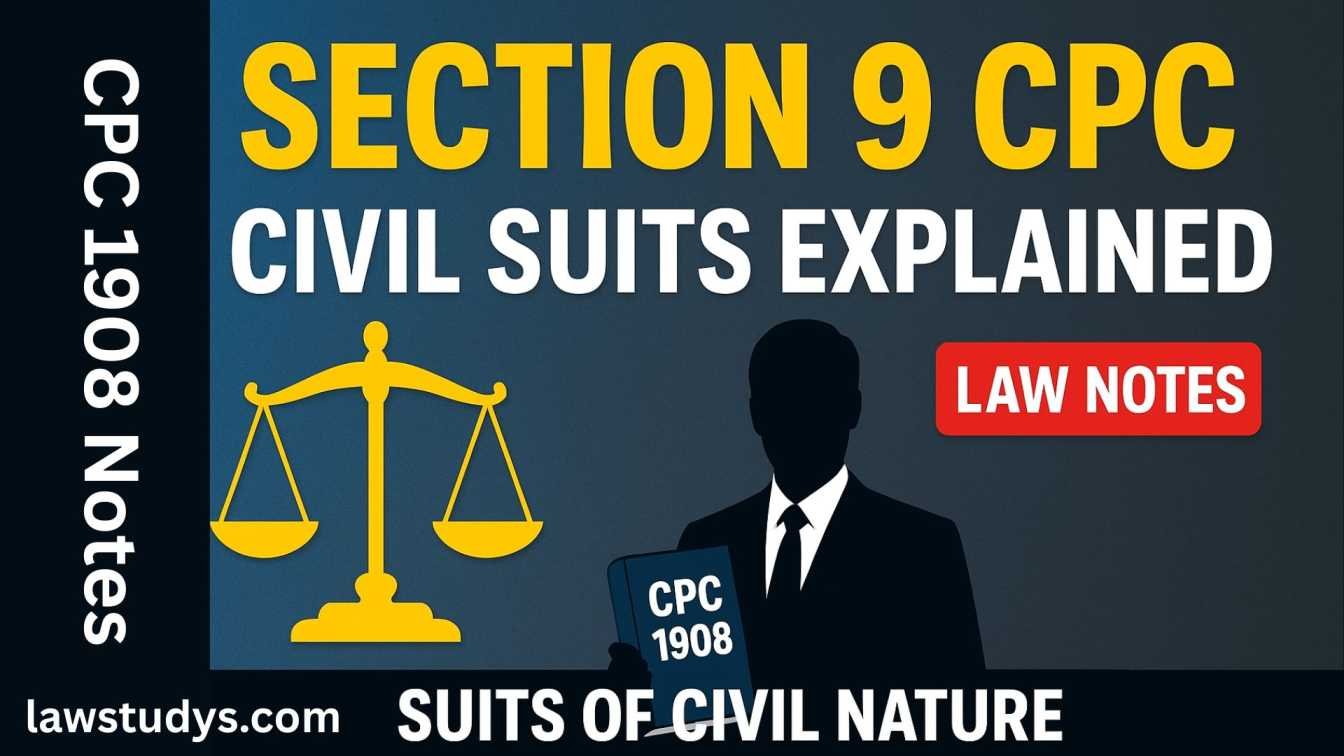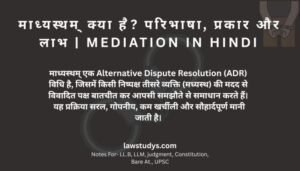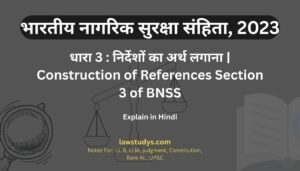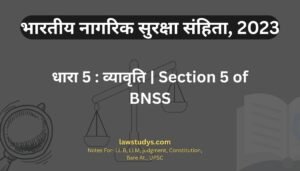In this article, an attempt has been made to explain in simple words what is Section 9 of the Code of Civil Procedure, what do you understand by a suit of civil nature and whether the court can try all civil suits –
Suits (proceedings or cases) are generally of two types (civil and criminal). As we know, civil cases are heard by civil courts and criminal cases are heard by criminal courts and both these courts have their own jurisdiction and their own procedure.
Suits of Civil Nature:
Suits of Civil Nature have great importance in the Indian legal system. Whenever disputes related to rights, duties, property, contracts or legal rights arise between two persons or institutions, they are called civil suits and such suits are resolved by the civil court.
A suit of civil nature means a suit which involves the question of creation, violation etc. of important rights or liabilities of a person or class of persons. If there is no dispute regarding such rights and liabilities in a suit, then that suit will not be considered a suit of civil nature.
The meaning of a suit of civil nature has been explained in Section 9 of the Code, according to which – a suit in which the question of right to any property or status is controversial is called a suit of civil nature, even if such right is completely based on the decision of questions related to religious customs or ceremonies.
Read Also – What is Social Action Litigation in India & Essential conditions
Section 9 also shows that all suits related to the right to property and status are suits of civil nature. In simple words, it can be said that a suit of civil nature is a suit whose objective is the enforcement of any civil right or civil liability against a citizen or the state itself.
Case – Assessing Authority, Ludhiana vs Mansharam (AIR 1965 Punjab 459)
In this case it has been said that – Civil rights mean such rights which a person gets by being a citizen of the state, whether such right is obtained by any act or not.
Case – Gurcharan Singh vs Mrs. Gurdayal Kaur (AIR 1982 Rajasthan 91)
Similarly, in this case it has been said that – while deciding the civil nature of any subsequent case, mainly two things (essence of the suit and the real nature of its object) should be taken into consideration.
Read Also – What is the Schools of Criminology And how many Types are there? – Criminology
Can the court try all civil cases – Many times this question comes before us that, can the court try and settle all types of civil cases or not. In response to this, provision has been made in Section 9 of the CPC that – The courts have the jurisdiction to try all types of civil suits, except those suits which are expressly or impliedly barred from being tried by them.
This means that, unless expressly or impliedly barred, the courts will try all types of civil suits i.e. the jurisdiction of civil courts is very wide. The jurisdiction of the court depends on the right to decide a suit, not on the merits and demerits of the decision of a case.
Whether a civil court will try a suit or not depends on the nature of the suit concerned, if the nature of the suit is civil then the court will definitely try such a suit. Civil courts have extensive power to try suits of civil nature, suits of civil nature are also called suits of civil nature.
Read Also – Delegated Legislation in India: Definition, Limits and Key Elements | Administrative Law
Criteria for suits of civil nature :
Many a times the question arises that which suits are civil in nature or which suit will be considered civil in nature. In this regard, Section 9 of the Civil Procedure Code, 1908 determines which suits can be heard by a civil court and what are its criteria?
(i) Suits related to rights and property – The property can be tangible or intangible, such as patent, copyright, trademark, voting rights, fishing rights etc.
(ii) Suits related to temples and other religious properties – Destroying, changing, interfering with the religious symbols of a temple etc. are included in civil suits. Idols are also property.
(iii) Suits related to compensation for civil wrongs and breach of contract, such as cases related to defamation, libel, malicious prosecution, compensation for illegal imprisonment etc. (d) Suits instituted for specific relief under the Specific Relief Act, such as suits for specific performance of contract, injunction, declaratory decree etc.
(iv) Suits relating to rights relating to common law, such as right to vote, right to use highway etc.
(v) Suits relating to right to worship (Muniyandi Kone v. Sri Ramanatha Sitapathy Heritage, A. Mangalanatha Swamy Temple, AIR 1982 Chennai 170)
(vi) Suits relating to right to bury the dead. (vii) Suits relating to religious or other processions.
(viii) Suits relating to the right of a person elected as an office bearer.
(ix) After divorce or restitution of conjugal rights. (x) Suits for enforcement of rights of a person as a member of a club.
(xi) Suit related to any contractual right.
(xii) Suit related to accounts.
(xiii) Suit for contribution.
(xiv) Suit related to partnership.
(xv) Suit for fee attached to religious and other post. Now it is not necessary for such fee to be attached to post or religious post.
(xvi) Suit related to customary right of privacy.
(xvii) Suit related to expulsion from caste or caste property.
(xviii) Suit related to validity and constitutionality of Acts of Legislature.
(xix) Suit instituted for compensation in case of wrongful dismissal from service is a suit of civil nature.
(xx) Suit against termination of service of a bus conductor is a suit of civil nature. (Ramkumar vs State of Haryana, AIR 1987 SC 2043)
(xxi) A suit related to the question of action in respect of the directors of schools recognized under any education act is a suit of civil nature.
Read Also – Temporary Injunction Under Order 39 CPC: Meaning, Principles & Procedure
Suits are not of civil nature :
suit whose main question for consideration is not related to civil or legal right but is prescribed as a member of any caste, institution or community is not considered a suit of civil nature. According to this, the following types of suits are not suits of civil nature –
(i) Suits in which caste related questions are mainly involved.
(ii) Only after maintaining dignity or respect.
(iii) Suits for voluntary payments not based on agreement or legacy.
(iv) Suits expressly prohibited by any act.
(v) Suits related to political questions.
(vi) Suits against public policy, etc.
Ushaben Navinchandra Trivedi vs. Bhagyalakshmi Chitra Mandir (AIR 1978 Gujarat 13)
In this case, the suit brought against the exhibition of the film Jai Santoshi Maa on the ground that it hurts the religious feelings of Hindus has not been considered to be a suit of civil nature.
Basanti Devi vs. Masjid Panch Visayatiyan (AIR 2016 Rajasthan 69)
In this case, the jurisdiction to hear suits relating to eviction from Wakf property has not been considered to be a suit of civil nature.
Important Posts
Doctrine of res gestae | Facts forming part of the same transaction | Sec. 6 Evidence
Administrative Law: Explanation of Definition, Nature and Scope





